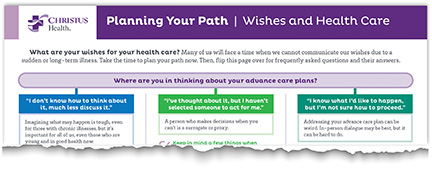CHRISTUS Health has created a one-page guide to help patients figure out where they are in the process of advance care planning and point them to resources so they can reach their goals.

Steven Squires, the system's vice president of ethics, led the work that resulted in the keystone document called "Planning Your Path | Wishes and Health Care." He wants the succinct reference to make it easier for care providers and patients to have often-difficult conversations around planning for care in the event of a sudden illness or as the end of life nears.
"I hope that more people will start talking about what is often a taboo topic, I think, in American culture," Squires says.
The document was the product of a "structured exercise" undertaken by CHRISTUS' palliative care advisory council to figure out the best method the system could adopt to facilitate advance care planning.
The council of about 16 people evaluated several popular formats and identified the strengths and weaknesses of each. Among the weaknesses group members cited, Squires says, was that some of the formats focused so much on what medical interventions someone did or didn't want that the person's overall goals of care were ignored.
In the end, Squires says, the consensus was that CHRISTUS should develop its own format that lessened or eliminated the drawbacks of the other methods and capitalized on their strengths.
'What are your wishes?'
One of the sources that informed the group's work was a study titled "Common Items on a Bucket List" published in 2018 in the Journal of Palliative Medicine. That study concluded: "The bucket list is a simple framework that can be used to engage patients about their health care decision making. Knowing a patient's bucket list can aid clinicians in relating each treatment option to its potential impact (if any) on the patient's life and life goals to promote informed decision making."

The printed guide CHRISTUS developed asks users at the start: "What are your wishes for your health care?" It notes that many people will face a time when they cannot communicate their wishes due to a sudden or long-term illness. It then asks: "Where are you in thinking about your advance care plans?"
Users get a choice of three answers, which each lead to a column of considerations, follow-up questions and QR codes. Those codes, when scanned with a smartphone camera, connect to various resources, such as a guide to having conversations about health care. The back of the guide covers frequently asked questions and has QR codes that link to additional resources.
Squires sees it as vital to the effective use of the guide that users have a "human touch point" – someone explaining the document's importance and usefulness as it is presented to a patient.
"What we don't want to do is leave something in a pile somewhere in the admissions process or in a physician's office without having somebody who knows what it is and is able to dialogue with people about it," he explains.
Relationship-building tool
Kathy Armijo Etre, vice president of mission integration at CHRISTUS St. Vincent Regional Medical Center in Sante Fe, New Mexico, introduced the guide to staff there this spring. She says the guide has been widely distributed among the nursing staff and to outpatient clinics.
Etre is on CHRISTUS' palliative care advisory council and was one of those who supported the idea of the system developing a distinct and innovative approach to advance care planning. She says the guide is a big step in that direction.
"When Steven came up with this, I loved it because it's a way to begin the conversation and help people place where they are in their decision-making process," Etre says.
Etre says the document aligns with the approach of Dr. Diane Portman, St. Vincent's director of palliative care, who urges that end-of-life planning be an ongoing relationship-based process between care providers and patients, rather than a form-based process. "This (guide) is a tool to help initiate the relationship building with patients," Etre says.
A member of St. Vincent's supportive care team who is nearing graduation as a nurse practitioner is using the guide as part of a capstone project on advance care planning. That staffer plans to help the team, formerly known as the palliative care team, create training on the use of guide. "It's the next most important thing to be done," Etre says.
Closing the gap
In Squires's view, end-of-life care is an especially important aspect of Catholic health care. He points out that one of the directives in the Ethical and Religious Directives for Catholic Health Care Services is to provide patients in danger of death with "appropriate opportunities to prepare."
Squires says the Catholic health care ministry can distinguish its end-of-life care by delivering it with more humaneness and compassion than other health care providers. It also can strive to close what he sees as a disconnect: people want to have their end-of-life wishes followed but they often are not actually making those wishes known.
That gap was highlighted in a 2019 study commissioned by the California Health Care Foundation that found that most Californians supported advance care planning but only about a third had put their wishes in writing.
"Maybe the role of Catholic health care is to close the gap, to say, 'What is it that's making this so darn difficult, and how can we help?'" Squires says. "Maybe this document is just a start, like one individual piece to this larger societal issue."
